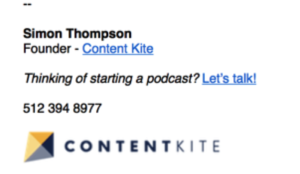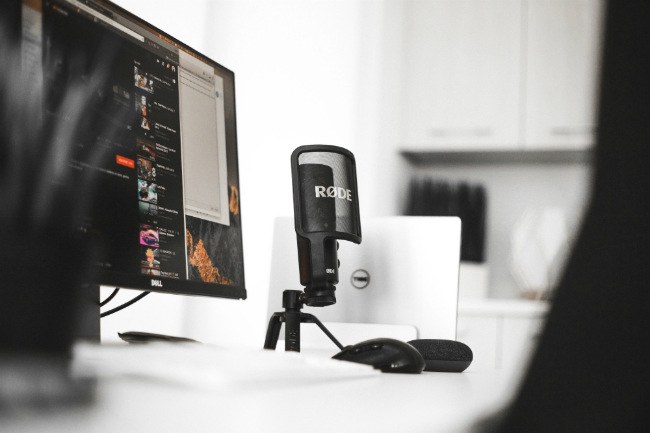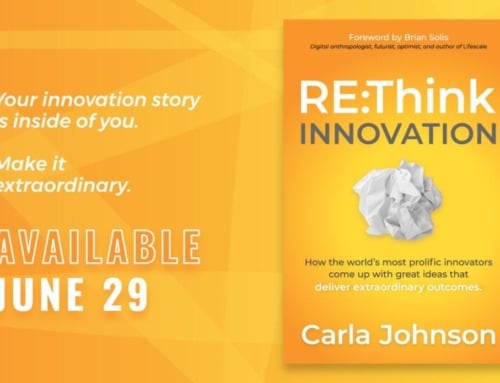This is part II in a series on podcasting for advertising agencies. Read part I here, then come back and join us for part II.
Earlier this week, I shared with you why and how podcasting for advertising agencies can help you win new clients. I even shared with you how to line up stellar guests (and new business prospects!) for your podcast. If you followed my advice, you’ve likely got some podcast guests waiting in the wings now.
So, you might be wondering: Now that I have podcast guests, what do I talk about with them?
I think the real question here is: how do I turn this interview into a sales/partnership conversation. I’ll get to this.
For the interview itself, though:
Rule #1: Serve the audience.
It needs to be something your core audience will actually find interesting. So, you can talk about that.
But the benefit of an interview, is that your guest is the content. Be curious about what they do, their story, and treat it like a conversation so you bring out the best in them.
Aside from that, the topic of conducting a great podcast interview is for another post entirely. I won’t get into it here. It is 80/20 though: you can extract the vast majority of value from a guest simply by asking them questions like you would ask someone at a dinner party.
But serve your audience: what do they want to learn about from your guest? You will probably find the same questions you have in your mind, are the same your guests have in their minds. Ask those questions.
Remember, your guest is the content—you’re just facilitating.
What’s important is that you don’t launch into a used-car-salesman-like pitch of your services (not that you would, dear erudite reader, but just to be sure…)
Your podcast is a relationship building tool. The sales and partnerships are secondary (as they are with any good business dealing). Give them something first, and with that something, you’re automatically giving them a reason to trust you, because you’re trustworthy.
How do I turn these new relationships into partnerships and sales?
This is the big question. Once you’ve put in the ground work of building a relationship, and giving them value, how do you bring up a partnership conversation if it makes sense to do so?
The operative phrase is “if it makes sense to do so.”
Don’t go rattling away about your offering if the person has no need for what you do. Ideally you would’ve done this pre-qualification before asking them to be a guest, so let’s assume they are the right person to speak to, potentially have a need, and are the type of company/person who can afford you.
As my friend and sales coach extraordinaire Liston Witherill says: “serve, don’t sell”. Sales come as a byproduct of service.
How you do this is going to be different from person to person, depending on your personality traits.
I’ll outline a few different trigger points where you can/should bring up this conversation, and a low-pressure way to do it.
Email signature
The most passive of the bunch. Simply include a call to action in your email signature. Every email becomes a mini reminder of what you do. If they have a need, they may ask about it. Like this:

Someone who is thinking of starting a podcast may click on that, or ask. Or they may not – but you lose nothing.
Ask on the call, post-interview
There are a few ways you can bring this up. The least direct way, is to simply ask them what they are working on (if it hasn’t already come up). What’s their main focus right now?
Polite society dictates the person should answer, then ask you the same question in return. When they ask, you can tell them. It’s that simple. If they indicate in some form or another that they have a need for what you offer, let them know you’d love to have that conversation with them, and set up a time for it.
Alternatively, if you’re the more gunslinging, direct type, you could just flat out ask them if they have a need for what you offer, or if they know someone who has that need.
When the episode goes live
It’s a good idea to notify guests when their episode is live. When you do, you could include a line as a “P.S.” asking them if they or anyone they know has a need for your offering.
For example:
Hi John,
Thank you again so much for coming on the show the other week! I know our audience will get a lot out of it, so we really appreciate it. Here is the link: {{link}}.
Let me know if you need anything.
Thanks,
Simon
P.s. If you know someone who is struggling to [solve problem that you solve], let me know and I’d love to see if we can help. All the best for now!
This message can obviously be tailored for the type of guest. For example, if you interviewed someone with an audience, you could ask them to share the episode here.
If they mention a need for what you offer
This should go without saying, but let’s clarify – there’s a right and a wrong way to bring this up. If, say, you offer Facebook ads management, and your guest brings up at some point in the conversation that “they haven’t been getting great results from Facebook ads” or something of the sort, it is perfectly reasonable to ask some more questions about that if you’re an expert.
Be a consultant here – not a salesperson. Ask why they’re not working. What is the specific issue they have. If it’s something you believe you could solve, then you’re doing them a disservice by not telling them. If you think you can fix their problem (once you’ve discovered what the actual problem is), let them know!
Isn’t starting a podcast a lot of work? Is it worth it?
Yes and no.
By now I’ve hopefully outlined how powerful podcasting can be purely as a sales channel – content marketing aside.
And as with any new marketing channel, there’s a cost/benefit analysis that needs to be done.
How much time will I need to commit? How much money?
All valid questions, and one that only you can answer.
What I will say, is this: if you do not outsource and systematize, you will not be consistent.
I am very confident about that. I know because I have been there myself, once upon a time, and have spoken to countless ex-podcasters who hung up their boots after 4-5 episodes because it was too much work.
But, if you properly outsource/delegate/systematize, there’s no reason it should take any longer than the length of the interview each week – say 20-30 minutes.
Think of it like this: you have a lot of calls each week, right? Well it’s one more of those, and maybe some research and email back and forth. No more than an hour/week (again, if you systematize).
So, is it worth it? It depends on how much a scalable relationship building tool is worth to you.
But with a podcast, you will always have something to offer someone, first. It gives you a reason to speak to someone other than “hey can I tell you about my stuff that I sell”.
That’s where the power of podcasting lies.






